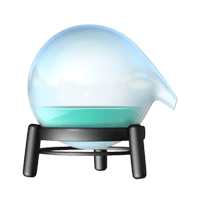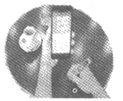本调研卷满分100分,考试时间120分钟。
听说部分(共34分)
一、听后选择(共12分,每小题1.5分)
听下面4段对话或独白。每段对话或独白后有两个小题,从每题所给的A、B、C三个选项中选出最佳选项。每段对话或独白你将听两遍。
请听一段对话,完成第1至第2小题。
1. Why do the speakers need a gift for Linda?
A. For Christmas. B. For her birthday. C. For her friend’s party.
2. What are they going to buy?
A. A T-shirt. B. A teddy bear. C. A music player.
请听一段对话,完成第3至第4小题。
3. Where is the girl probably now?
A. In the classroom. B. At Xiangshan Park. C. At the shopping mall.
4. What’s the possible relationship between the two speakers?
A. Cousins. B. Neighbors. C. Classmates.
请听一段对话,完成第5至第6小题。
5. How does the girl usually go to school?
A. By subway. B. By bike. C. By bus.
6. What can we learn about Karl Benz?
A. He didn’t like riding horses.
B. He was an engineer in a machine shop.
C. He invented the car in the year of 1844.
请听一段独白,回答第7至第8小题。
7. What can we learn from the passage?
A. Blind people expect our help.
B. Guide sticks help blind people be noticed.
C. Guide dogs are raised by blind people as pets.
8. What is the speech mainly about?
A. Why blind people need help when walking.
B. What difficulties blind people may have.
C. How blind people get help with walking.
二、听后回答(共10分,每小题2分)
听对话,根据对话内容笔头回答问题。每段对话你将听两遍。
请听一段对话,完成第9小题。
9. When will the meeting begin this morning?
________________________________________________________
请听一段对话,完成第10小题。
10. What does the boy usually do in his spare time?
________________________________________________________
请听一段对话,完成第11小题。
11. What does the boy’s father want him to be?
________________________________________________________
请听一段对话,完成第12小题。
12. Where is the boy going?
________________________________________________________
请听一段对话,完成第13小题。
13. Whose pencil case is it?
________________________________________________________
三、听后记录并转述(写)(共12分)
第一节
记录关键信息(共6分,每小题1分)
请听一段独白,根据所听到的内容和提示信息,将所缺的关键信息填写在相应位置上。这段独白你将听两遍。
How to Study History | |
Fill colors in the book | ◆ Use 14 color pens to highlight important points ◆ |
Create charts and timelines | ◆ Create a timeline covering all the events ◆ Prepare 16 trees and outlines |
Use mind maps | ◆ Help you create 17 connections and memorize information easily |
Practice 18 as much as you can | ◆ Take down what you learn ◆ |
第二节
转述(写)(共6分)
20. 请再听一遍独白,转述(写)你所听到的主要内容。
I’ve got some advice from Chris on … _________________________________________
__________________________________________________________________________
知识运用(共20分)
四、单项填空(共12分,每小题1分)
从下列各题所给的A、B、C、D四个选项中,选择可以填入空白处的最佳选项。
21. We should value the time we spend with _________ family and friends.
A. their B. our C. his D. my
22. Lisa always talks to me _________ English to help with my speaking.
A. in B. on C. to D. at
23. I wanted to try the new ride, _________ my mother said it was not safe.
A. so B. or C. but D. and
24. —I found a school uniform on the playground.
—It _________ belong to John. Look! His name card is here.
A. could B. need C. must D. would
25. —_________ suggestions did Mr. Wang give you on table manners?
— Three.
A. How many B. How much C. How long D. How often
26. Erquan Yingyue is one of _________ pieces of music that I’ve ever heard.
A. moving B. more moving C. most moving D. the most moving
27. Lily likes Cha Jing so much that she _________ it for at least an hour every day.
A. read B. reads C. is reading D. was reading
28. —What was your little sister doing when I called you yesterday?
—She _________ for losing a game.
A. cries B. cried C. is crying D. was crying
29. —What’s your plan for the coming weekend?
—I _________ an invention museum with my parents.
A. visit B. was visiting C. visited D. am going to visit
30. I _________ on the school swim team for nearly four years.
A. will be B. have been C. am D. was
31. Our school restrooms _________ by the cleaners three times a day.
A. clean B. cleaned C. are cleaned D. is cleaned
32. —Do you know _________ at the Olympics?
—Yes. In 1936.
A. when basketball became an event B. when basketball becomes an event
C. when did basketball become an event D. when does basketball become an event
五、完形填空(共8分,每小题1分)
阅读下面的短文,掌握其大意,然后从短文后各题所给的A、B、C、D四个选项中,选择最佳选项。
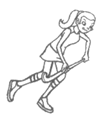
Maybe it’s my love of hocky that connects my great aunt Helen with me. She has always kept telling me her stories of playing hocky when she was in her twenties. The stories 33 me so much that I would like to listen to them over and over. She used to say, “Just go after what you want, Sarah. Don’t be 34 of failing.”
Aunt Helen should know. Twenty years ago, Aunt Helen had been dreaming of winning a champion for her hometown. And one day, she got a chance to try out for a league. This league was created to please hocky fans. But for my aunt, it was to follow her hocky 35 . She pictured what it would be like to win a champion for her hometown! She 36 a large flag hanging in the hocky field with her name on the banner (横幅).
On the day of the tryouts, Aunt Helen played hocky for hours. Although she tried her best, she was still not sure about whether she could be accepted because all the candidates (候选人) played very well. She was worried she would not be on the list.
A week later, Aunt Helen received a 37 from Chicago. She opened it and excitedly learned that she had been invited to join in the main tryouts the next month!
But as the days went by, Aunt Helen became more and more worried about traveling to Chicago alone. What if she went all that way and 38 ? When the day of the main tryouts came, she was finally too afraid to go.
“I never tried my best to take it when the chance came and I regret it every day.” Aunt Helen has spent the rest of her life 39 what would have happened if she had gone to those tryouts. Because of this, she never missed another chance in her life.
Every dream is worth chasing, and real embarrassment comes from never 40 .
33. A. interested B. upset C. relaxed D. puzzled
34. A. proud B. certain C. afraid D. tired
35. A. rule B. team C. decision D. dream
36. A. watched B. imagined C. remembered D. considered
37. A. gift B. letter C. prize D. box
38. A. failed B. left C. fell D. missed
39. A. forgetting B. recalling C. wondering D. complaining
40. A. smiling B. winning C. losing D. trying
阅读理解(共36分)
六、阅读下列短文,根据短文内容,从短文后各题所给的A、B、C、D四个选项中,选择最佳选项。(共26分,每小题2分)
A
Cool Inventions That Will Take You to the Future
Scientists never stop amazing us with fascinating inventions. Here are some cool ones that are already in stores or will be there soon.
| Portable Toaster There is actually an idea of a knife that could not only cut the bread into small pieces, but be heated enough to toast a slice of bread. You could take this time-saving and easy-to-clean tool anywhere. It would be really cool, for it looked like a light saber(剑). |
| Hand-Held Copy & Paste Tool Copy & Paste allows you to scan and print images anywhere and on anything. Simply push the button and scan the object, and then the image can be printed on any surface using ink. For the moment, this is only an idea, but when this device is on sale, there will be a long line waiting to buy it. |
| Electronic Sensor Pen With Phree Pen, you can write anything anywhere. When it went into market, it became really popular. All the symbols can be written on any surface, read by a computer and sent to a smart phone or a computer. You can write things down without paper at hand. |
| Scanner Determining Food Composition (成分) TellSpec was made for those who want to quickly know the composition of a dish. It scans the products and then sends a list of information about the nutritional value to a special phone app. Now you don’t need to worry about the safety of the products you eat. |
41. With the help of the Copy & Paste tool, you can _________.
A. cut the bread into small pieces B. send information to a smart phone
C. print images on any surface D. scan the food to check its safety
42. If you want to find out the composition of a dish, you can use _________.
A. TellSpec B. Copy & Paste C. Phree Pen D. Portable Toaster
43. According to the passage, how many inventions are only ideas now?
A. One. B. Two. C. Three. D. Four.
B
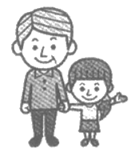
Grandpa and Me
As my summer vacation drew nearer and nearer, I made a long list of things I wished to do and could hardly wait to begin a brand-new journey. However, when my mom told me that I had to live with my grandfather for six weeks, I complained. A voice inside me said that it would be miserable to live with my grandpa, which meant no afternoon baseball games with my neighborhood friends.
The first week with Grandpa was fine. We went out for dinner and watched TV together. One day, Grandpa was sitting at the table reading the newspaper. I sat on the couch and flipped (快速翻动) through my baseball card collection. “Wish I had a Hank Aaron card,” I said to myself.
When Grandpa heard me, he said in surprise, “I didn’t know you liked baseball, Susan.” I explained that it was my favorite sport and I usually played it all summer with my friends. Grandpa stood up shakily and walked to the door. “Let’s go,” he said, with excitement. “I want to show you something.”
We drove for quite a while, and when Grandpa finally stopped the car, we were in front of some old houses. A sign on each house said “Land Will Be Sold. Call For Details.” I noticed that Grandpa had a faraway look in his eyes. “I haven’t been here for decades,” he whispered. “Probably twenty or thirty years.” We walked there and he pointed down the street and said, “That’s the field where I used to play baseball every summer.” Then I realized where we were: This was the house where Grandpa grew up! We looked inside a window and saw a big mess. No one had lived here for a long time.
On the ride home, Grandpa was very quiet. I thought about how he must miss his old home and the friends he grew up with. If he could just go back in time for a few minutes, he would feel very happy and less lonely. Then I realized that six weeks away from home was not too bad, especially with Grandpa around.
44. The writer complained about her coming vacation because ___________.
A. she could not play baseball games with friends
B. she could not enjoy her baseball card collection
C. she would go out for dinner with her grandfather
D. she would leave her home and live in an old house
45. When Grandpa heard Susan liked baseball, he was ___________.
A. hopeful and thankful B. confused and upset
C. worried and unhappy D. surprised and excited
46. What might Susan most probably do after visiting the old house?
A. Cleaning the old house with her neighborhood friends.
B. Complaining about her boring vacation to her mom.
C. Sharing her baseball cards with her schoolmates.
D. Listening to Grandpa’s life story in the past.
C
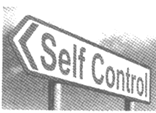
Self-control is a skill that children need to succeed in school, socially and emotionally. The development of self-control begins at birth and continues throughout our lives. As babies, we have little or no control over our behaviors and emotions, but as we get older, with the help of parents or caregivers, we learn how to take turns, how to pay attention in class, stick to a challenging task, and restrain (制止) from hitting another child. These abilities continue to develop in our childhood and then youthhood. Also, it is clear that being impulsive (易冲动的) can have bad effects on children, causing interpersonal problems, poor physical health, and psychiatric disorders.
Therefore, by learning self-control, children can make right decisions and respond to situations in positive ways. One of the effective strategies, when helping children develop self-control abilities, is to select developmentally proper tasks. Try setting up simple goals first, where success is expected, before moving onto the next goal. For preschoolers, goals might include not interrupting or not fighting on the playground. For early elementary school students, right goals might be following bedtime rules.
However, it’s not enough to set up simple goals, because for children of the same age, there are still some differences in the development of self-control abilities. Some general strategies often help them learn right self-control behaviors.
· Take a break
Encourage children to take a break or “time in” whenever they feel down, annoyed or angry.
Stepping away from an upsetting situation can help a child calm down.
· Teach and provide attention
Paying attention is a skill that can be taught. Encourage children to resist interrupting by learning to observe others without talking, so they can join in easily. Make sure to provide children with attention at times so they don’t feel ignored and therefore are unlikely to interrupt.
·Use proper rewards (奖励)
In order to develop positive behaviors, children need frequently positive feedback. Praise and consistent feedback can be highly rewarding for young children. It is important to let a child know what a desired behavior is.
· Use activities designed to teach self-regulation (自我管理)
Using specific activities can help teach young children skills that improve self-control. Some of these skills include dealing with “wanting something I can’t have”, understanding feelings, and controlling anger.
47. What can we learn from Paragraph 1?
A. As people get older, their attention will improve naturally.
B. Being impulsive can often cause bad results in children’s grades.
C. Children can learn how to control themselves with the help of parents.
D. Self-control development begins at birth and keeps growing till youthhood.
48. What can teachers do when students feel very disappointed?
A. Teach and provide attention. B. Give rewards and suggestions.
C. Teach skills to regulate themselves. D. Encourage them to take a break.
49. Which of the following would be the best title for the passage?
A. Time Waits for No Man–The Development of Self-Control
B. Have Power over Your Mind–Tips on Developing Self-Control
C. Prevention Is Better than Cure–Rules of Self-Control Behaviors
D. Think Twice Before You Act–The Importance of Self-Control Skills
D
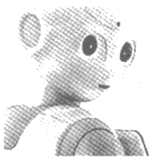
Technology Progress
On June 22, 1927, Charles Lindbergh flew into Dayton, Ohio, for dinner at Orville Wright’s house. It had been just a month since the young pilot’s first ever individual nonstop crossing of the Atlantic, and he felt he ought to pay respects to the pioneer of flight.
Forty-two years later, on July 16, 1969, Apollo 11 astronaut Neil Armstrong was allowed to bring a personal guest to the Kennedy Space Center to view the launch of NASA’s towering Saturn V rocket. Armstrong invited his hero, Charles Lindbergh. That’s how fast technology advanced in the 20th century.
However, progress isn’t what it used to be now. Northwestern University economist Robert Gordon argues that by 1970, all the key technologies of modern life were in place: electricity, highways, telecommunications, and the like. After that, innovation (创新) and economic growth simply couldn’t keep going as fast as the last 100 years–a period Gordon calls “the special century”. Gordon argues the lives of people in developed nations look and feel the same in 2020 as they did in 1979 or 1989.
Slowing down is good in one small way, though bad in most of the ways that count. Rapid changes can sometimes be disorienting (令人迷惑的). And when things develop at a lower speed, people and institutions do have more time to breathe and fit in. But slowing down isn’t what it should be. In many areas of technology, the forward movement today feels tragically slow, even nonexistent.
Consider consumer robotics. There’s huge potential for robots to help us. But home robotics companies seem to keep folding. For example, social robot maker Jibo closed in March after raising almost $73 million.
Our century’s one signature technology achievement is smartphones. At this point, we’ve had them in our pockets long enough to begin to appreciate their dangers. Meanwhile the list of possibly world-changing technologies that get people’s attention but still remain in the original stage is very long. Self-driving cars, AR glasses. Need I continue?
Indeed, these are all hard problems. But historically, solving the big problems has required continuous, large-scale investment (投资), often with private markets and taxpayers sharing the cost. In this century, we need to undo some bad results of the last great boom (繁荣) by developing affordable zero–and negative–emissions technologies right now. That’s another hard problem–and to solve it, we’ll need to rethink what made the “special century” so special.
50. The writer mentions Charles Lindbergh in Paragraphs 1 and 2 to show that __________.
A. Charles has contributed greatly to technology
B. Charles paid respects to the pioneer of flight
C. technology developed rapidly in the 20th century
D. technology has advanced to a higher new level
51. The underlined word “folding” in Paragraph 5 probably means ___________.
A. shutting B. separating C. growing D. operating
52. What can we learn from the passage?
A. Some world-changing technologies are not making progress.
B. Home robotics companies failed because of little investment.
C. It’s time to realize the disadvantages of fast development now.
D. It doesn’t take us long before we realize the dangers of smartphones.
53. The writer probably agrees ___________.
A. markets and taxpayers have a duty to develop technologies
B. innovation and investment are needed for technology advance
C. what made the last century special will happen in the new century
D. rapid changes in technology are bad in most of the ways that count
七、阅读短文,根据短文内容回答问题。(共10分,每小题2分)
Hector, the Superhero
Hector dreamed of being a superhero, just like Universe Man. If he were a superhero, he would zoom high in the sky and save cats stuck in trees. He would stop robbers with his superpowers. He would turn bad guys into ants or even cabbages.
One day, as he practiced flying around his room, his mom knocked on his door.
“Remember, you’re going to the eye doctor today,” she said.
“But Mom,” Hector said. “I can see fine.”
“You might need glasses to see better,” Mom said. “Then you wouldn’t have to hold your comics (漫画书) up to your nose. And you’d look cool, like a movie star!”
“I don’t want to be a movie star. I want to be a superhero, like Universe Man. And he doesn’t wear glasses.” Hector said. None of the other kids in his class wore them, either. What would they think?
Hector and his mom went into the department store. They passed by superhero T-shirts, action figures, and games. Was that a Universe Man toy on the top shelf? He squinted (眯着眼看), but he couldn’t tell.
The eye doctor’s office in the department store had racks and racks of eyeglass frames, plus huge pictures of smiling people wearing glasses. Those smiles didn’t fool Hector. They weren’t superheroes.
Hector sat in a big chair. The doctor checked his eyes by pointing to a chart of the letters. The top line was easy, the second line he could guess, but the next lines were blurry. Then Hector looked through a huge machine, like a thick, heavy mask. The doctor turned a wheel and changed the lens on the machine again and again. At last, it was time for picking frames. But Hector didn’t see any frames a superhero would wear. He put a pair of blue frames on and looked in the mirror. “They’re OK.” But he looked different. Not like Universe Man at all.
One week later, Hector’s glasses were ready. They felt funny on his nose, but not too bad.
Hector looked around. Wow! His mom’s eyes were green! How come he had never noticed that silver in Dad’s hair? And there was a lucky penny, lying on the ground for him to pick up!
Everything was sharp and clear. No bad guys could get past him now. With his super glasses, he could save the world! “I have the power!” he cried.
54. What did Hector dream of being?
55. Did Hector want to wear glasses at first?
56. Where was the eye doctor’s office?
57. When were Hector’s glasses ready?
58. How did Hector feel about his glasses?
书面表达(共10分)
八、文段表达(10分)
59. 从下面两个题目中任选一题,根据中文和英文提示,完成一篇不少于50词的文段写作,文中已给出内容不计入总数,所给提示词仅供选用。请不要写出你的校名和姓名。
题目①
假如你是李华,请你用英语给交换生Peter写一封邮件,告知他下周将举办的英语角活动的具体时间和地点(线上),以及活动的主要环节:交流本学期的学习和生活经历,其中有一位来自加拿大的学生Tom进行分享。
提示词语:English corner, online, experience
提示问题:· When and where will the English Corner be held?
· What’s the main activity this time?
Dear Peter,
______________________________________________________________________
______________________________________________________________________
______________________________________________________________________
Yours,
Li Hua
题目②
规则一方面限制了我们的活动,另一方面也保障了我们的安全。
出于新冠疫情防控的需要,学校新增了一些规则,如进学校需测体温,室内需戴口罩等。
某英文网站正在开展以”规则”为主题的征文活动。假如你是李华,请用英文写一篇短文投稿,谈谈疫情期间你校新增的规则,以及你对这些规则的看法。
提示词语:wear masks, take one’s temperature, be good for
提示问题:· What are the new rules during the COVID-19 pandemic (疫情)?
· What do you think of the new rules?
Some new rules are made in our school during the COVID-19 pandemic. _____________
______________________________________________________________________
______________________________________________________________________
参考答案
一、听后选择
1. B 2. A 3. C 4. B 5. A 6. B 7. B 8. C
二、听后回答
9. (The meeting will begin) at10 (am/this morning).
10. (The boy/He usually) watches movies (in his spare time).
Watch movies.
11. (Jack’s /The boy’s father wants him to be) a doctor.
12. (The boy/He is going) to the sports center.
13. (It’s) Mary’s (pencil case).
It/The pencil case belongs to Mary.
三、听后记录并转述(写)
14. different 15. Record/record 16. family 17. stronger 18. writing 19. Divide/divide
20. 略
四、单项填空
21. B 22. A 23. C 24. C 25. A 26. D 27. B 28. D
29. D 30. B 31. C 32. A
五、完形填空
33. A 34. C 35. D 36. B 37. B 38. A 39. C 40. D
六、阅读理解
41. C 42. A 43. B 44. A 45. D 46. D 47. C 48. D 49. B
50. C 51. A 52. A 53. B
七、阅读短文,根据短文内容回答问题。
54. A superhero (just like Universe Man).
55. No, he didn’t. / No.
56. (The eye doctor’s office /It was) in the/a department store.
57. (His glasses/They were ready) one week later.
58. (He/Hector felt/thought that his glasses/they were) cool/great/super, giving him power/ making everything sharp and clear.
He/Hector was very satisfied with his new glasses.
八、文段表达
题目1
Dear Peter,
I’m really glad to invite you to come to our online English corner. It will be held at 4 o’clock next Sunday afternoon.
We will talk about our life and studies of this term in this special period. And I really hope to hear yours. We will also invite Tom, a Canadian student, to share his interesting experience with us. I’m sure it will be a really meaningful time for you and you will enjoy it.
Please log on to join us!
Yours,
Li Hua
题目2
Some new rules are added in our school during the COVID-19 pandemic. For example, we have to wear masks at school. We need to take our temperature before entering the campus. And, we are not allowed to stay too close to each other.
I think all of the new rules are necessary in the special period. They can not only help to control the pandemic but also help to prevent the spread of many diseases like flu.
Let’s keep the rules.
附:录音文本
Text 1
W: We need a gift for Linda. Her birthday is tomorrow.
M: How about this music player?
W: It’s nice, but look at the price. It’s really high!
M: Yes, it is. Let’s look for something else.
W: Look at the T-shirt. It’s lovely.
M: It’s great and not that expensive. I think she will love it.
W: Her favorite color is blue. Let’s take the blue one with a teddy bear on it.
Text 2
M: Hello! This is Mark living next door. May I speak to Lily?
W: Sorry. Lily has gone to the shopping mall. Can I take a message for her?
M: Yes, please. Our class plan to climb Xiangshan this Saturday morning, since we really want to relax ourselves after the final exam. Lily wasn’t in the classroom when we talked about it. We wonder if she would like to join us.
W: It’s very kind of you to invite her. So, when and where will you meet?
M: We’ll meet in front of our community library at 7:30 am, and hopefully we’ll arrive at Xiangshan Park at about 8:30 am.
W: OK. I’ll tell her as soon as she comes back.
M: Thank you very much.
Text 3
M: How do you usually get to school, Betty?
W: I take the subway most of the time. I seldom go by bus or by car because of the heavy traffic jams in the morning.
M: That’s true. There are too many cars running on the road now. By the way, do you know when the car was first invented?
W: Not really.
M: I just read an article about it. The car was invented in 1885, and its inventor was an engineer named Karl Benz.
W: Did the article give more information about him?
M: It sure did. He was born in 1844. He used to work in a local machine shop, and always dreamed of making a machine that could run without horses. He tried a lot of times and finally made it.
W: What a cool story!
Text 4
Have you ever noticed blind people around you? They may walk or move difficultly because they’re not able to see. But they can still have good lives with the help of the guide stick or a guide dog.
The life of blind people is full of risks. In some countries, they usually use a white stick to help them move around or travel. It’s an important tool for them, since it can help blind people find out their surroundings and guide their way. It’s also a symbol to make people notice blind people and not to block their way.
We always think we should help people who are in trouble. However, when you see blind people walking with a guide dog, don’t rush to help too fast, because maybe they don’t need your help. And don’t talk to a guide dog while it is at work. Guide dogs work with their owners as a team, so don’t treat them as pets. They are good friends as well as helpers for blind people.
Text 5
W: Hi, Mike, there is an online meeting this morning. M: Well, I almost forgot it. Is it about the New Year Party preparation? W: Maybe. It will be held at 10 am. M: OK. Thanks for reminding me. |
Text 6
W: What do you usually do in your spare time, John? M: I usually watch movies. W: Me, too. What kind of movies do you like? M: I like movies that are interesting and touching, just like Ne Zha. |
Text 7
W: What are you going to do when you grow up, Jack? M: I want to be a reporter because I am good at writing. But my father doesn’t think so. W: What does your father advise you to do? M: He thinks to be a doctor is a good job. |
Text 8
W: David, you seem in a hurry. Are you going to the science speech now? M: No. I’m going to the sports center. I like working out. W: Wow, no wonder you are always energetic. M: Thank you. |
Text 9
W: Look! Whose pencil case is this? M: It might be Bob’s. He looked for his pencil case just now. W: But it is a pink one with a lovely dog on it, and Bob doesn’t like pink at all. M: Then it must belong to Mary. All her personal belongings are pink and she likes animals, especially dogs. W: You are right. Look! Here is her student ID card. |
Text 10
Hello, everyone. I’m Chris. Studying history and memorizing dates and events can be stressful. However, the following tips can help you do better. First, fill some colors in the book. Use different color pens to highlight important points and record them in colors. This will help when you prepare for exams. Second, create charts and timelines to connect events. Instead of learning different events separately, you can create a timeline covering all the events. You also need to prepare family trees and outlines to get a general view of the course. Third, use mind maps. The use of mind maps can help you create stronger connections and memorize all the information easily. Last, practice writing as much as you can. You must take down what you learn and divide each event into causes and results. Hope my advice will be helpful. |
